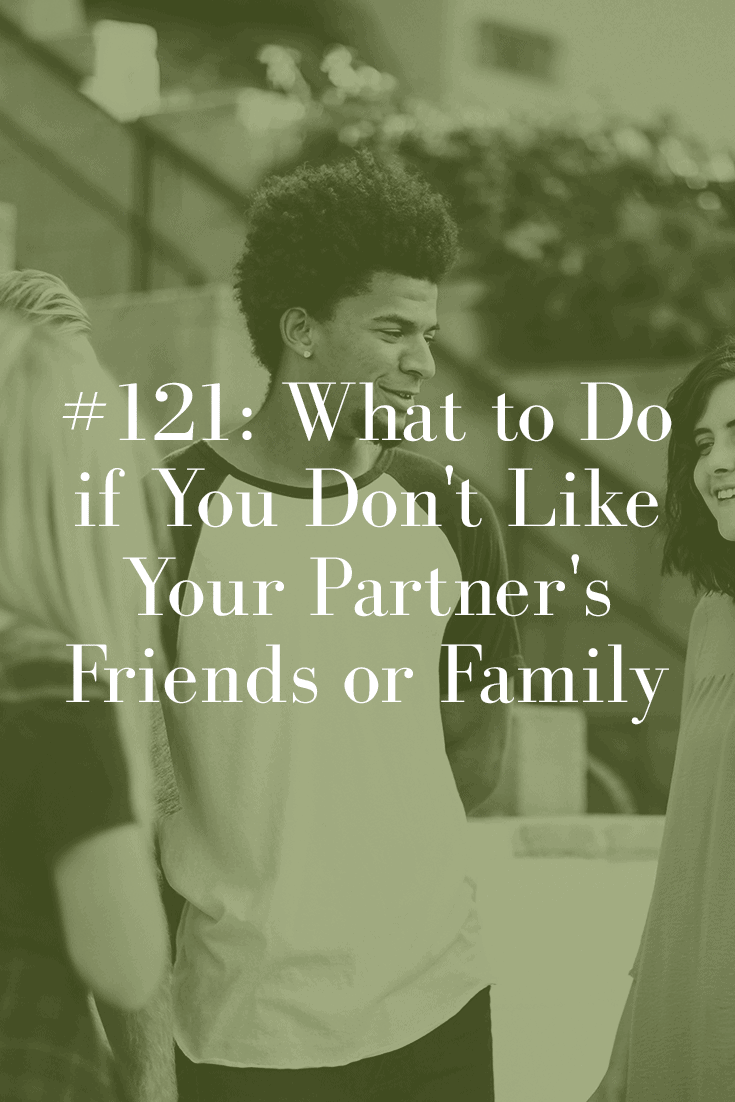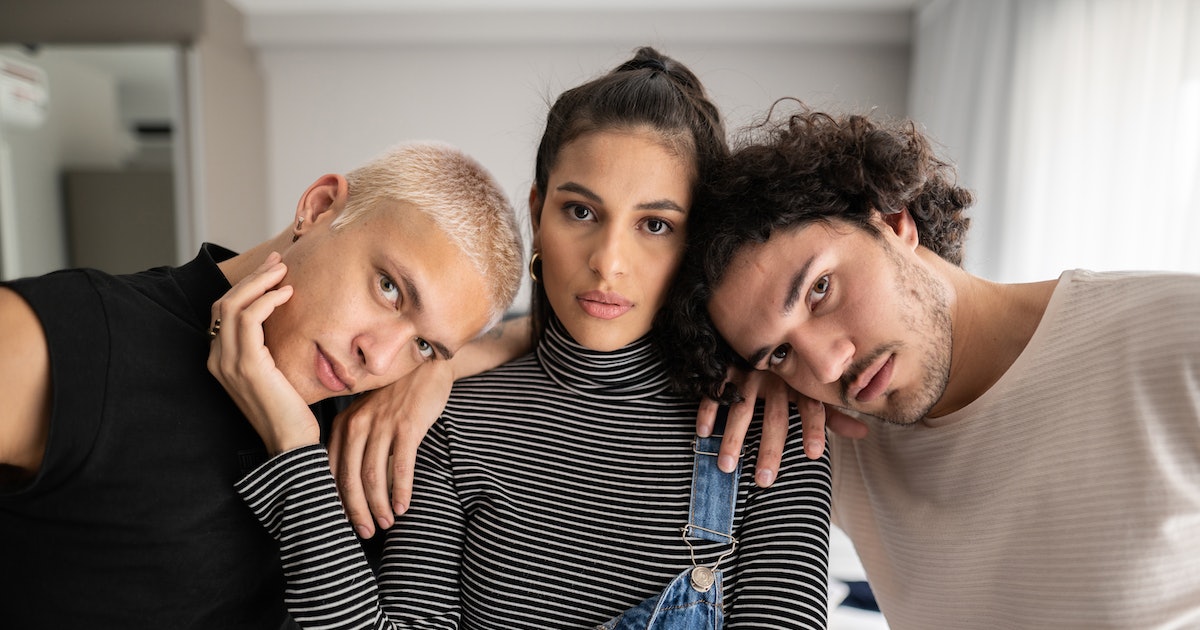
Having a strong bond with your partner’s friends can be a crucial aspect of a healthy relationship, but what if you’re just not feeling it? It’s normal to have different preferences and personalities, but the question remains: is it okay if you don’t like your partner’s friends? In this article, we’ll explore this potential dilemma, discuss its possible implications, and provide some helpful tips on how to navigate this situation with understanding and respect. So, let’s embark on this journey together and find out if it’s alright to not click with your partner’s crew!

This image is property of abbymedcalf.com.
Why it’s important to like your partner’s friends
Creating a harmonious relationship
Liking your partner’s friends is an essential aspect of fostering a harmonious relationship. When you genuinely like and enjoy the company of your partner’s friends, it creates a positive atmosphere for everyone involved. It enables you to feel more comfortable in social situations and promotes a sense of unity and togetherness as a couple. By making an effort to like your partner’s friends, you are actively contributing to the overall happiness and well-being of your relationship.
Promoting trust and open communication
Liking your partner’s friends can also play a significant role in promoting trust and open communication. When you have a positive relationship with your partner’s friends, it becomes easier for you to trust their judgment and decisions. You feel more confident in discussing any concerns or issues that may arise, knowing that your partner’s friends are there to support both of you. This mutual trust and open communication strengthen the bond between you and your partner, creating a solid foundation for a lasting and healthy relationship.
Avoiding isolation or exclusion
Another important reason to like your partner’s friends is to prevent feelings of isolation or exclusion. If you do not like your partner’s friends, it could potentially lead to your partner feeling torn between their friends and you. This might result in them spending less time with their friends, causing them to feel isolated and disconnected. By making an effort to like and include your partner’s friends, you prevent any feelings of exclusion and ensure that your partner can maintain healthy and fulfilling friendships while still being committed to your relationship.
Supporting your partner’s social connections
Liking your partner’s friends is a way of supporting their social connections and friendships. Your partner’s friends are an important part of their life, and by genuinely liking them, you demonstrate that you value and respect your partner’s relationships. Supporting your partner’s social connections also shows that you are committed to their overall happiness and well-being. When you actively support and encourage your partner’s friendships, it strengthens the bond between you and enhances the overall quality of your relationship.
Understanding the reasons behind your dislike
Identifying specific behaviors or traits
If you find yourself not liking your partner’s friends, it is essential to identify specific behaviors or traits that contribute to your dislike. Sometimes, certain behaviors or traits can clash with your personality or values, making it challenging to connect with them. By pinpointing the exact reasons behind your dislike, you can better understand what aspects you need to address or explore further. It is important to remember that everyone is unique, and it is natural to have different personalities and preferences. However, by recognizing these differences, you can begin to empathize and find ways to navigate your interactions with your partner’s friends.
Assessing personal biases or past experiences
In some cases, our dislike for our partner’s friends may stem from personal biases or past experiences. It is important to assess whether your negative feelings are based on objective reasons or if they are influenced by your own unresolved issues. Reflecting on past experiences or biases can help you identify any potential triggers that may be influencing your perception of your partner’s friends. By recognizing and addressing these biases, you can approach your interactions with an open mind and give your partner’s friends a fair chance.
Considering cultural or background differences
Another factor to consider when understanding your dislike for your partner’s friends is cultural or background differences. It is common for individuals from different backgrounds to have varying customs, beliefs, or communication styles. These differences can sometimes lead to misunderstandings or conflicts. By taking into account these cultural or background differences, you can develop a deeper understanding and appreciation for your partner’s friends. Open dialogue and a willingness to learn about different cultures can bridge any gaps and lead to stronger connections.
Reflecting on compatibility and shared values
Sometimes, our dislike for our partner’s friends may be a result of a lack of compatibility or shared values. It is essential to reflect on whether your partner’s friends align with your own values and lifestyle. While it is not necessary for them to share all your beliefs, a certain level of compatibility can contribute to a more harmonious relationship. Reflecting on compatibility and shared values can help you gain clarity on whether you have fundamental differences that might be impacting your ability to connect with your partner’s friends.
Communicating your feelings to your partner
Choosing an appropriate time and place
When it comes to discussing your feelings about your partner’s friends, it is crucial to choose an appropriate time and place. Find a moment when both you and your partner are relaxed, available, and open to having a conversation. Avoid bringing up the topic during a heated argument or when either of you is tired or stressed. By choosing an ideal setting, you create a space where both you and your partner can openly share your perspectives without distractions or unnecessary tension.
Using ‘I’ statements to express your perspective
When communicating your feelings to your partner, it is important to use ‘I’ statements to express your perspective. By framing your thoughts with ‘I,’ you take ownership of your emotions and avoid sounding accusatory or confrontational. For example, instead of saying, “Your friends are boring,” try saying, “I feel like I struggle to connect with your friends because our interests differ.” This approach allows you to express your feelings without putting your partner on the defensive, fostering a more productive and empathetic conversation.
Avoiding blame or criticism
When discussing your feelings about your partner’s friends, it is crucial to avoid blame or criticism. Instead of pointing fingers or making negative judgments, focus on expressing your emotions and concerns. Remember that your goal is not to attack your partner or their friends but to create a better understanding between you both. By maintaining a non-judgmental and compassionate approach, you foster a safe environment for open and honest communication.
Finding compromise and seeking common ground
During the conversation with your partner, aim to find compromise and seek common ground. Recognize that relationships are filled with complexities and compromises are often necessary. Explore ways in which you can both find middle ground, whether it is through shared activities, finding opportunities for deeper conversations, or introducing new friends who may have mutual interests. By actively seeking compromise and common ground, you demonstrate your commitment to strengthening your bond with your partner while also maintaining respect for their friendships.
Exploring the impact on your relationship
Assessing the degree of influence
When you don’t like your partner’s friends, it is essential to assess the degree of influence it has on your relationship. Consider how often you interact with your partner’s friends and the impact it has on your overall relationship dynamics. If their presence is minimal or infrequent, it may not significantly affect your relationship. On the other hand, if your partner’s friends play a significant role in their life, it becomes crucial to address any underlying tensions to maintain a healthy and thriving partnership.
Recognizing the role of boundaries
Understanding the role of boundaries is key when it comes to navigating your partner’s friendships. Healthy relationships require clear boundaries, and it is important to communicate your needs with your partner. Discuss what is acceptable and what may cross a boundary for you. By openly expressing your concerns and expectations, you create a space for your partner to understand your perspective and find a balance that works for both of you.
Balancing individual friendships and couple dynamics
Balancing individual friendships and couple dynamics is crucial for a healthy relationship. It is essential to strike a balance between maintaining individual friendships and nurturing your bond as a couple. By actively working on finding this balance, you ensure that both you and your partner feel fulfilled and supported in your respective social connections. Finding ways to integrate your partner’s friends into your shared social activities can help cultivate a sense of belonging and unity.
Considering the long-term effects on happiness
The long-term effects of not liking your partner’s friends can potentially impact your overall happiness. Forcing yourself to be in situations where you feel uncomfortable or disconnected can lead to resentment or feelings of isolation. It is vital to consider the long-term implications of not addressing your feelings and finding ways to navigate your relationship with your partner’s friends. Recognize that your happiness and well-being are essential, and finding a resolution that works for everyone involved is crucial for maintaining a fulfilling and satisfying relationship.

This image is property of www.verywellmind.com.
Finding alternatives and potential solutions
Negotiating shared activities or events
One potential solution for navigating your feelings towards your partner’s friends is by negotiating shared activities or events. Discuss with your partner the possibility of participating in activities or events where you feel more comfortable or have common interests. By finding shared experiences that you both enjoy, you can create an opportunity for more positive interactions with your partner’s friends.
Building separate social circles
Building separate social circles can also be a beneficial approach for navigating your dislike for your partner’s friends. Encourage your partner to spend quality time with their friends independently while you focus on cultivating your own friendships and social connections. This can help maintain a healthy sense of independence within your relationship and reduce any potential conflicts or discomfort when it comes to interacting with your partner’s friends.
Forming new friendships as a couple
Another alternative is actively seeking to form new friendships as a couple. Engaging in activities or joining social groups where you can meet new people can lead to the development of meaningful friendships that you both enjoy. By expanding your social circle together, you create an opportunity for shared experiences and connections that align with both of your preferences.
Seeking professional guidance or advice
If navigating your feelings towards your partner’s friends becomes challenging, seeking professional guidance or advice can be beneficial. Relationship counselors or therapists can provide valuable insight and strategies to help address any underlying issues and enhance your overall relationship. They can offer a neutral and supportive space where both you and your partner can express your concerns and work towards finding suitable solutions.
Navigating differing opinions within the relationship
Respecting individual autonomy
When faced with differing opinions about your partner’s friends, it is important to respect individual autonomy. Recognize that your partner has the right to maintain their friendships and have connections independent of your relationship. Respecting their autonomy demonstrates trust and fosters a stronger sense of security and freedom within your relationship.
Fostering empathy and understanding
To navigate differing opinions within your relationship, it is crucial to foster empathy and understanding. Try to put yourself in your partner’s shoes and consider their perspective. By actively listening and seeking to understand their viewpoint, you create a foundation for open and compassionate communication. Fostering empathy and understanding can lead to a deeper connection and a greater willingness to find common ground.
Seeking compromise and common ground
When faced with differing opinions, seeking compromise and common ground becomes essential. Work together to find a middle ground that respects both your needs and your partner’s friendships. This may require flexibility and open-mindedness from both parties. By actively seeking compromise, you can find a resolution that allows for a harmonious relationship while still honoring your individual perspectives.
Recognizing red flags or toxic friendships
While it is important to respect your partner’s friendships, it is also crucial to recognize any red flags or toxic friendships that may be impacting your relationship. If your concerns stem from genuine concerns about your well-being or your partner’s well-being, it is essential to voice these concerns to your partner. Communicate your worries in a compassionate and non-judgmental manner and work together to address any potential issues that may arise.

This image is property of imgix.bustle.com.
Reevaluating the importance of personal preferences
Recognizing the influence of personal growth and change
Reevaluating the importance of personal preferences involves recognizing the influence of personal growth and change. Over time, our preferences and priorities may shift, and what once bothered us may no longer hold the same significance. Acknowledge that personal growth and change are natural parts of life, and it is essential to continuously reassess our perspectives and priorities.
Reassessing the impact on overall relationship satisfaction
Take a step back and reassess the impact of your dislike for your partner’s friends on your overall relationship satisfaction. Consider whether this dislike carries enough weight to significantly affect your happiness and well-being. If it does, it may be worth exploring further ways to address your concerns and find a resolution. However, if it has a minimal impact, it may be beneficial to focus on other aspects of your relationship that bring you joy and fulfillment.
Evaluating the significance compared to other factors
When evaluating the significance of your dislike for your partner’s friends, it is important to consider it in relation to other factors in your relationship. Reflect on the overall quality of your partnership, the level of trust and communication between you and your partner, and the depth of your emotional connection. By evaluating the significance in the context of your entire relationship, you can determine whether it is a minor issue or something that requires more attention.
Considering the perspectives of trusted friends or family
Seek guidance and input from trusted friends or family members who can provide an outside perspective on your situation. While it is essential to prioritize your own feelings and preferences, hearing the viewpoints of those you trust can offer valuable insight and help you gain a more well-rounded understanding. Remember to approach these conversations with an open mind and consider their opinions within the context of your relationship dynamics.
Individual vs. couple decision-making
Balancing personal preferences and shared choices
Finding a balance between personal preferences and shared choices is integral to a healthy relationship. While it is important to respect each other’s individuality, there are instances where shared decisions need to be made for the benefit of the relationship as a whole. By actively working together to strike this balance, you demonstrate a commitment to both your own fulfillment and the success of your partnership.
Determining the level of compromise required
Determining the level of compromise required depends on the specific circumstances and the impact your dislike for your partner’s friends has on your relationship. Assess whether finding a compromise is feasible and how much flexibility both you and your partner are willing to exercise. In some cases, finding a middle ground may require more compromise from one or both parties, while in others, a minor adjustment can suffice.
Considering the impact on individual happiness
When navigating individual vs. couple decision-making, it is vital to consider the impact on individual happiness. Evaluate whether compromising your feelings towards your partner’s friends significantly affects your overall well-being and contentment. Strive for a decision that maximizes both your individual happiness and the happiness you experience as a couple.
Revisiting the concept of independence within a relationship
The concept of independence within a relationship becomes relevant when determining individual vs. couple decision-making. Healthy relationships allow for individual growth and autonomy. Reflect on how your feelings towards your partner’s friends align with your need for independence and personal fulfillment. Communicate your desires to maintain your independence within the relationship, while also finding ways to nurture your connection as a couple.

This image is property of www.readunwritten.com.
Seeking support and advice from others
Talking to friends or family for different viewpoints
Seeking support and advice from friends or family members can provide different viewpoints on your situation. Discussing your concerns with loved ones who know you well can give you insights you may have overlooked. Share your thoughts and listen to their perspectives, considering the wisdom and experiences they bring to the conversation. Remember that their input should be considered alongside your own assessment of the situation.
Engaging with relationship counselors or therapists
When faced with challenging dynamics regarding your partner’s friends, engaging with relationship counselors or therapists can offer professional guidance and support. These professionals specialize in relationship dynamics and can provide tools and strategies to help you navigate your emotions and concerns. They offer a safe and neutral space to explore your feelings and find healthy solutions that align with your values and goals.
Joining support groups or online communities
Joining support groups or online communities that focus on relationship dynamics can provide a platform for sharing experiences and gathering advice from others who may have navigated similar challenges. These groups offer a sense of community and the opportunity to gain insights and solutions from a diverse range of perspectives.
Reading books or articles on relationship dynamics
Books or articles on relationship dynamics can offer valuable insights and practical guidance on navigating various aspects of relationships, including dealing with your partner’s friends. Look for reputable resources that provide evidence-based advice and explore different perspectives on this topic. Reading such material can provide you with additional knowledge and tools to help you address your concerns in a healthy and constructive manner.
Final thoughts and reflection
Accepting differences in friendship preferences
In conclusion, it is essential to accept and embrace differences in friendship preferences within a relationship. Recognize that it is normal for individuals to have diverse social connections and that you may not always have the same affinity for your partner’s friends. However, by adopting a friendly and open-minded attitude towards them, you can foster harmony and support your partner’s social connections.
Prioritizing open and honest communication
Prioritizing open and honest communication is vital when addressing your feelings towards your partner’s friends. By expressing your emotions in a respectful and considerate manner, you create a space for understanding and empathy. Maintaining open lines of communication allows you to work together with your partner to find suitable compromises and solutions.
Understanding the need for individual fulfillment
Recognize the importance of individual fulfillment within a relationship. Understand that your partner’s friends play a significant role in their life and contribute to their overall happiness. Supporting your partner’s social connections and respecting their need for meaningful friendships enhances the overall well-being and satisfaction of your relationship.
Maintaining a healthy balance in relationships
Lastly, maintaining a healthy balance in relationships requires effort, empathy, and understanding. Find ways to integrate your partner’s friends into your shared activities while also nurturing your own friendships and social connections. By prioritizing both individual and couple needs, you can create a balanced and thriving relationship environment.






